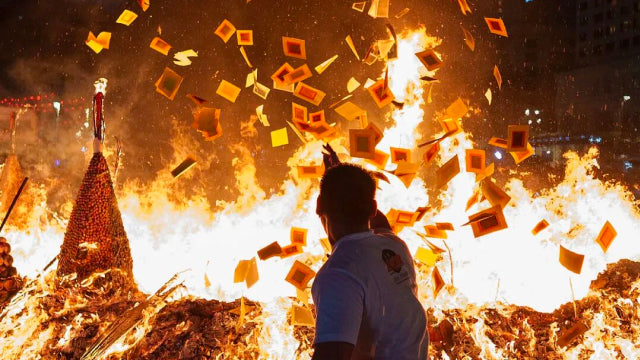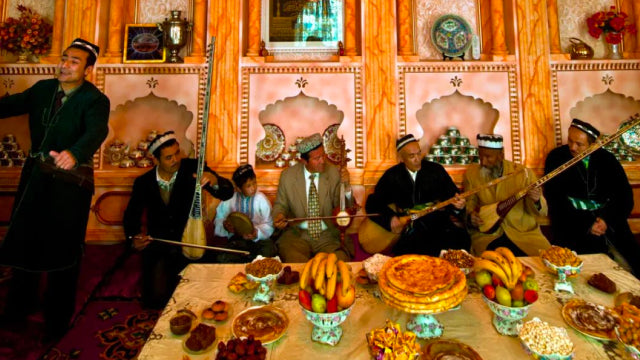If you visit China in mid-August to the September , you may find yourself stunned by a sight that feels both otherworldly and deeply human. Beneath the wind-and-rain bridges along the Longtou River, hundreds of glowing flames flicker on the water’s edge.

The river shimmers orange, paper money floats into the smoky night sky, and people’s silhouettes blur into shadows. For a moment, it feels as if the boundary between heaven and earth has dissolved. The living and the departed gather together — under a different kind of “city lights.”
This is the Zhongyuan Festival, often called the Ghost Festival, one of China’s most meaningful cultural traditions.
1. What is Zhongyuan Festival?
The Zhongyuan Festival, held on the 15th day of the 7th lunar month (August–September in 2025), is part of China’s national intangible cultural heritage. Alongside Tomb-Sweeping Day (Qingming) and the Winter Solstice Festival, it is one of the three most important events for honoring the dead.

Unlike Tomb-Sweeping Day, when the living visit graves, Zhongyuan is when the dead are believed to visit the living. Families light incense, burn paper offerings, and welcome their ancestors home for one night.
Not only being a “spooky” event, the Ghost Festival is about gratitude, remembrance, and love.
2. Rituals and Regional Traditions
Across China and beyond, the Zhongyuan Festival takes on unique forms:

- Shaobao: In Guizhou, paper offerings are sealed into neat bundles called shaobao (烧包), like spiritual care packages. Each one is labeled with the name of the ancestor, a respectful title, and the sender’s name and date — like sending a well-addressed parcel through a cosmic postal service.
- Ancestor money (also known as hell money) is burned, believed to provide financial comfort for ancestors in the other world. The glowing ashes floating into the night sky symbolize prayers rising to heaven.
- Shi Gu: Especially in southern China, locals perform a ritual called Shi Gu (施孤), or “offering to the lonely souls.” They place offerings at street corners for wandering spirits — those who died in war, disaster, or have no descendants left to honor them. Considering that some of these souls may be children or disabled and unable to reach higher places, some offerings are laid directly on the ground.

- In Guangxi, Families share duck dishes, symbolizing strength and protection against misfortune. Many locals say returning home for Zhongyuan is more important than Lunar New Year.
- In Keelung, Taiwan, the Ghost Festival becomes a month-long community event, known as the Keelung Zhongyuan Festival. Each year, local family clans take turns organizing grand parades and constructing towering water lanterns, which are then released into the sea — a symbolic gesture of lighting the way for wandering spirits.

3. Why Ghosts Don’t Scare Us
In the days leading up to Zhongyuan Festival, it’s said that the gates of the underworld swing wide open — and for a few nights, spirits walk among us. There are hundreds of tales about "ghosts walking at Ghost Festival night” Some whisper that the streets are full of ghosts. Parents would tell children not to wander after dark.

Contradictory, people light incense on sidewalks and burn paper offerings at street corners. They leave little bundles — clothes, money, and package for long journey — for the souls that might be passing through. People explain it:
Perhaps a ghost scares someone is another one’s beloved, lost.
Amid the flickering flames and drifting smoke, many people believe that the ones we love — the ones we miss — are right there among the ghostly procession. And that’s why, even in stories filled with specters and shadows, Zhongyuan is a festival of fear as well as remembrance.
4. We all need a day to remember those we’ve loved and lost

In ancient times, Chinese culture believed in “treating the dead as the living.” Offerings of food, incense, and paper gifts is a way to continue caring for elders and ancestors, even after they’re gone. They give people's love a destination.
Chinese historian Qian Mu once said:
“The death of a friend is not their death — it is my death. Because as long as their image lives in my heart, they are still alive. But if I no longer live in theirs, then a part of me is already gone.”
When words fail, when mourning feels too big, we let the flames carry our messages skyward — toward those we can no longer touch, but never truly lose.
5. Experience Zhongyuan Festival with Bridge to Locals
For many visitors, Zhongyuan can feel mysterious. With Bridge to Locals, you’ll not only watch the rituals — you probably would be invited to be part of them.
Sitting with a Guizhou family as they fold shaobao paper bundles, carefully writing ancestor names in neat calligraphy. As night falls, you follow a family to the Longtou River. Lanterns sway in the warm breeze, their reflections shimmering like stars on the water. Together, you place glowing offerings at the river’s edge. Flames rise, smoke curls skyward......

This isn’t just festival tourism. It’s a chance to connect with China’s living culture.
Source: https://mp.weixin.qq.com/s/9sSdzWQXT7XwViELZaMciQ








Leave a comment
This site is protected by hCaptcha and the hCaptcha Privacy Policy and Terms of Service apply.